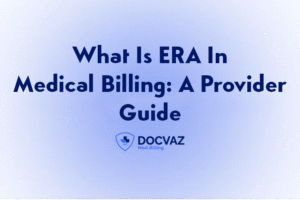What is a Provider Write-Off?
A provider write-off is the quantity a clinical provider chooses not to collect from a patient or payer, effectively eliminating it from the balance sheet as uncollectible income. The provider writes off claims that are collectible due to causes such as contractual agreements with insurers, patient financial hardship, or denied insurance claims. A provider examines why the claims cannot be collected, estimates the exact figure to be written off, and then adjusts the individual’s account and the provider’s records to reflect this enduring decrease in income.
When a provider writes off, it happens:
Here are some reasons that make it possible, as mentioned below:
Contractual agreements:
Insurers often have agreements with providers that dictate the maximum figure a provider can costs for their facilities. Any amount more than the contracted rate is written off, as it is considered to be the provider’s agreement to lower their charges to comply with the contract.
Patients’ financial hardships:
A patient may write off a balance if the patient is unable to pay the bills because of financial complications or if the provider offers financial assistance programs.
Denied insurance claims:
When an insurance company denies a claim, the delivers might estimate that the claim is uncollectible and write it off, especially after exhausting the appeals procedure.
Billing policies:
Write-offs are also used to account for their prices connected with billing and collections that are not recoverable through payments, according to the provider’s policies.
Reasons for writing off a claim
A health provider might write off a claim for several reasons, including:
Contractual write-off:
- The provider agrees, through a contract with an insurance company, to accept a predetermined, diminished payment rate for facilities. The difference between the billed and allowed amount is written off.
Charity or hardship write-off:
- A provider might forgive a patient’s bill if they qualify for a financial assistance program, demonstrating the provider’s commitment to community care.
Small balance write-offs:
- If an individual owes a small quantity, the provider might decide that the administrative price of collection is not worth the effort and write off the balance.
Bad debit write-offs:
- A claim becomes bad debt when attempts to collect payments from a patient or insurer are unsuccessful. The provider may then write off the amount as uncollectible.
Timely filing write-offs:
- Insurers have strict deadlines for claims submissions. If a claim is submitted late, it is denied, and the provider must write off the balance.
Uncredentialed provider write-offs:
- A new provider who is not yet credentialed with an insurance company might have their claims denied, leading to a write-off.
How to write off a claim?
To properly write off a claim, a healthcare practice must adhere to a standardized and well-documented process:
Identify eligible write off:
Review denied claims, outstanding balances, and patient financial circumstances to estimate if they qualify for a write off.
Establish internal policies:
Create clear guidelines for when and how write-offs should be authorized, confirming persistent compliance with ethical standards.
Document the reasons:
For every write off, record the specific reason and supporting evidence, such as a denial letter from an insurer or a patient’s financial hardship application.
Record the write off:
Make a timely and accurate entry into the practice’s billing and accounting system, marking the unpaid claims as “not to be pursued”.
Audit regularly:
Periodically review write-off reports to analyze trends. This might support identifying and preventing recurring concerns, like specific billing like certain billing errors that frequently outcomes in revenue loss.
What are the necessary and unnecessary write-offs?
| Necessary write-offs | Unnecessary write-offs |
|
|
What steps should be adhered to avoid unnecessary write-offs?
Here are some steps to avoid unnecessary write-offs that can potentially enhance your practice’s bottom line:
- Uses reporting and analytics software:
- Leverage medical billing software with built-in analytics to detect trends and significant revenue loss sites. It permits proactive action before write-offs happen.
- Conduct regular audits:
- Do internal audits to catch recurring concerns such as billing and coding mistakes earlier, decreasing the unnecessary write-offs.
- Expert staff:
- Delivers you ongoing training to confirm your billing teams stay updated on industry regulations and best practices to minimize errors.
- Stay attentive:
- Tailored to payers’ needs, involving the insurance verifications, pre-authorizations, and claim submission on time to prevent any denials and bad debts.
Can doctors write off unpaid bills?
Yes, doctors can write off unpaid bills, but the procedure and reasons behind it fluctuate based on the situations and the policies of the clinical practices. There are numerous cases where write-offs might be appropriate, for example, bad debts, charity care, and small balances. But you should take care of these points when you are writing off unpaid bills:
- Confirm that write-offs are well-documented and complaint with internal polices.
- Persistently minister unpaid bills and examine the patterns to decrease the future write-offs.
- Tailored to IRS instructions for bad debts deductions while maintaining effective billing practices to minimize unnecessary write-offs.
Book A Free Consultation With Our DocVaz Medical Billing Expert Today!
Are you ready to reduce your write-offs and increase your practice’s revenue? Our professional medical billing and RCM experts are here to support. Schedule a free consultation to see how we can streamline your billing, confirm complaints, and elevate the collections. Let DocVaz take the stress out of your revenue cycle!
FAQ’s
When must medical bills be written off?
Ehrn, they are collectible because of contract restrictions, insurance denials, patients' hardships or billing errors, and after proper documentation.
Can providers write off deductibles?
No, unless it is an approved condition. Daily wwaivingg deductibles might violate the payer contracts and legal statutes.
What are contractual write-offs?
It's the distinction between the provider’s charge and the insurer permitted figure write-offs as part of a payer contract.
What are common types of provider write-offs?
Contractual, charity care, bad debts, small balance, promotional, administrative, and some other as well.
How are write-offs different from adjustments?
Write-offs are voluntary reductions by the providers; it is often due to hardships or uncollectible accounts. Adjustments align charges with insurance contracts or rectify billing errors.




